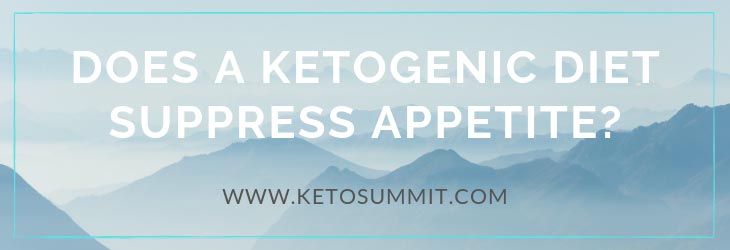Ketogenic Diet and Appetite Suppression – Why Keto Makes You Less Hungry?
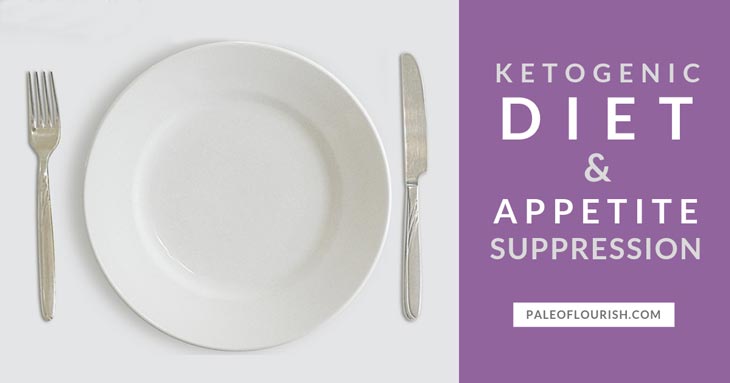
One of the best benefits of a ketogenic diet is its ability to make you feel less hungry (i.e., it suppresses your appetite).
If you’ve been into weight-loss or dieting, then you’ll know that this is a huge benefit. So much so that drug companies make lots of money selling appetite-suppressing pills. But yet, here’s a natural way to curb your cravings and prevent yourself from overeating all the while eating nourishing foods. Could this be real? And if so, why does it work?
If you’re unfamiliar with the ketogenic (AKA keto or ketosis) diet… it’s a low carbohydrate diet geared toward putting your body into a state of nutritional ketosis. In that state, your body will produce more ketones (which can be made from your own fat stores) than usual. And your body will burn those ketones for energy rather than the typical glucose it uses.
There are many potential benefits to being in this state of nutritional ketosis including weight loss. But in this article, I’ll look specifically into appetite suppression, which is something that could lead to weight loss.
I’ll take you through the scientific studies of ketogenic diets to see if keto actually helps you stay more full and less hungry. Because, let’s face it, that would be a very cool benefit of keto!
For those of you that don’t want to read the whole article…
I’ll jump the gun and tell you upfront that yes, there is some scientific research concluding that a ketogenic diet is appetite suppressing and very little research suggesting that it isn’t.
However, what most researchers don’t know yet is why keto makes you less hungry.
Is it the high fat in the diet, or the low carbohydrates, or is there something magical about these ketones? And I’ll go through the research on the potential mechanisms in this article as well. My hypothesis for why keto is appetite suppressing is that it lacks hyperpalatable foods for you to crave, but I haven’t seen any specific research that backs that up yet.
If you’re ready to get started with a ketogenic diet, then get our free 7-day keto meal plan here.
Table of Contents – Ketogenic Diet and Appetite Suppression
- Does A Ketogenic Diet Suppress Appetite?
- Fasting or Severe Calorie Restriction Also Suppresses Appetite
- How Do Studies Measure How Hungry Someone Is?
- Why A Ketogenic Diet Suppresses Appetite: High Protein
- Why A Ketogenic Diet Suppresses Appetite: High Fat
- Why A Ketogenic Diet Suppresses Appetite: High Ketone Levels
- Why A Ketogenic Diet Suppresses Appetite: Changes in Hormone Levels
- What’s the Answer? Why Does Keto Makes You Less Hungry?
Does A Ketogenic Diet Suppress Appetite?
One of the common things that people on a ketogenic diet say is how they are so full most days that they forget to eat! In fact, this can be a problem for many people as they undereat.
As one keto dieter puts it: “I kind of feel bad for feeling so full while being on a “diet” :)”
Is this amazing benefit of a ketogenic diet actually backed up by science or is it just one of those low carb myths that persist?
When I researched into this, I was surprised to find a good body of research from the past 2 decades showing that a ketogenic diet does suppress appetite. A 2014 review of all the studies in this field – that paper was titled “Do ketogenic diets really suppress appetite? A systematic review and meta-analysis” – concluded the following:
[The] benefit of a ketogenic diet is in preventing an increase in appetite, despite weight loss, although individuals may indeed feel slightly less hungry…
Long-term studies of low carbohydrate diets like this 2-year study) have also found that those on the low carbohydrate diet “reported being less bothered by hunger” than those on the low-fat diet for those 2 years. These results are consistent with those found by the study funded by the Atkins Foundation in 2007. (I cite this 2007 study, which has potential biases due to its funding and researchers (one of whom worked as a nurse with Dr Atkins), because other articles on this topic have referenced it. But I want to make it clear that there are many other unrelated research groups that have found the same results independently.)
Many other studies (which are linked to in the sections below) also back up these findings.
So is it conclusive? Does keto definitely make you feel less hungry?
As with pretty much anything, there’s always some research that points the other way! There have been studies (like this one) on low carbohydrate ketogenic diets that found no noticeable appetite suppressing effects (even though the people they studied lost weight).
And older studies by Rosen suggest that because you initially feel hungrier, your hunger scale shifts. So when you get less hungry a few weeks into keto, your brain attributes that to a feeling of less hunger than before. But regardless of whether your lessened hunger is real or imaginary, people do tend to eat less because of it and changes in your appetite-influencing hormones now suggest that something is definitely going on in your body.
So what should you expect when you go keto?
And Lyle McDonald notes in his book, The Ketogenic Diet: A Complete Guide For the Diet and Practitioner, “[a]necdotally, some individuals have a strong suppression of appetite while others do not. This discrepancy can probably be ascribed to individual differences.”
So if you try a ketogenic diet, you’ll likely feel less hungry and more full, but then again, you might be one of the unlucky ones that don’t feel that way.
As a side note, most people do feel more hungry during the initial few weeks as you transition from burning sugar to burning fat. This fat-adaptation period is also sometimes called Keto Flu.

Fasting or Severe Calorie Restriction Also Suppresses Appetite
A ketogenic diet isn’t all that unique in helping you feel less hungry. Fasting or diets that restrict calories a lot (often called very-low-energy diets) also have this amazing ability. Even high protein or low fat diets have been observed to have this same effect.
This has made it difficult to determine exactly what causes appetite suppression in keto diets. And below are some possible explanations that scientist have suggested.
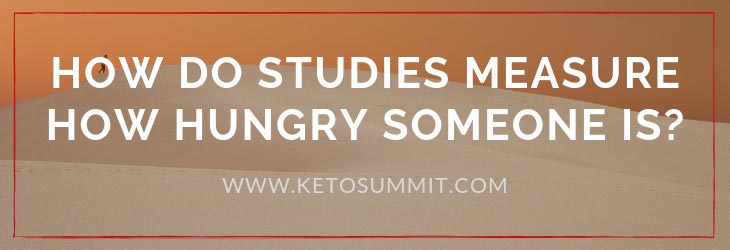
How Do Studies Measure How Hungry Someone Is?
Before I get to those possible reasons for why a ketogenic diet can make you feel more full and less hungry, here’s a quick aside…
Ever wondered how on earth scientists determine just how hungry or how full someone is?
Ok, maybe it’s just me that questions these things. But in case you’re interested…
Most studies use the visual analog scale (VAS) technique for determining how hungry or full someone is. This just means a questionnaire where you draw the answer by placing a dot on a line.
This technique was developed by Silverstone and Stunkard in 1968 and is now widely accepted as the typical way to measure appetite although there is some potential for error and manipulation.
The basics of this technique is filling out a series of questions by indicating where on a 10 centimeter line you feel your answer lies. An illustration of this is below:
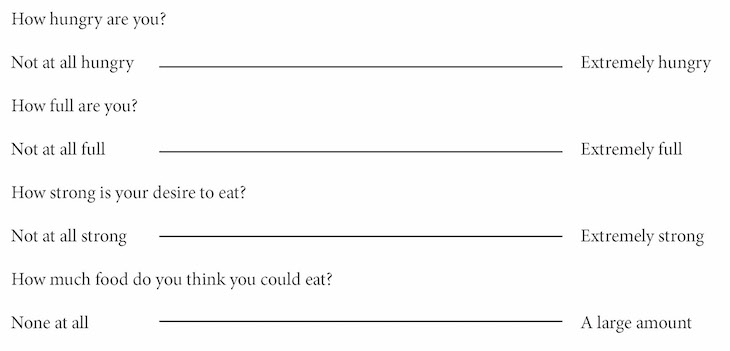
visual analog scale VAS example
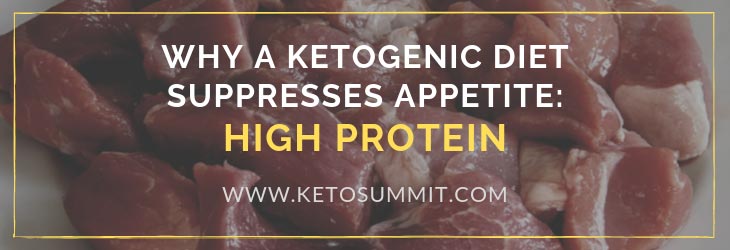
Why A Ketogenic Diet Suppresses Appetite: High Protein
One possible reason for why a ketogenic diet curbs hunger is its higher protein content.
Traditionally, a ketogenic diet has not been a high protein diet. If you look at studies that used ketogenic diets to treat epilepsy, those diets (often called Classical Ketogenic Diets) have typically been very high fat with very little protein and carbs.
However, with the popularity of Atkins and other low carb diets (like South Beach), a lot of researchers started looking into higher protein ketogenic diets and their potential to help people lose weight.
In general, high protein diets (regardless of whether they are also ketogenic or low carb or high carb) tend to be very satiating . And you’ve probably noticed yourself that you get full pretty easily from eating steak.
A group from the Arizona State University tested this theory in 2005. They conducted a 6-week trial where they closely studied 2 low carbohydrate diets (one where people went very low carb so that they were in nutritional ketosis – blood ketone levels reached 0.7 mM on average by week 2 – and one where the people also went on a low carb diet but didn’t go into nutritional ketosis). They found both versions of low carb to have appetite suppressing benefits. The study therefore concluded that: “it is the protein content of the diet and not the severity of dietary carbohydrate restriction that affects perceived hunger”
Of course, not every agrees with this theory. And the design of the 2005 experiment does pose some flaws that could explain the lack of a difference in appetite suppression between the two diets they studied.
This 2015 Obesity Review paper analyzed many of the ketogenic diet and very low calorie diet studies. They found that very low calorie diets where people were eating less protein than generally recommended still found themselves feeling more full and less hungry. This led to them speculate that there was something else at play other than just high protein amounts in the diet (at least to explain the appetite suppression effect in both ketogenic and very low calorie diets).

Why A Ketogenic Diet Suppresses Appetite: High Fat
So could it be the high fat amount in ketogenic diets that make them curb hunger and cravings?
It’s been show that the taste of some fats in our mouth could make us feel fuller before it even enters our stomach. But there are several other ways in which fat have a satiating effect (including the release of certain appetite hormones).
Conversely, high fat foods have often been linked to overeating. However, it appears that it’s usually hyper-palatable high fat foods (i.e., foods that contain fat with carbs with salt like potato chips) that are the most problematic.
Further, as both Lyle McDonald and the 2015 Obesity Review paper noted, very low calorie diets (which are necessarily low fat diets) also have hunger suppression effects. So, if it’s assumed that the same mechanism must be in effect, then it’s unlikely that high fat is cause.

Why A Ketogenic Diet Suppresses Appetite: High Ketone Levels
The 2015 Obesity Review paper tentatively concluded that:
“Although other contributory factors cannot be ruled out, ketosis appears to provide a plausible explanation for the suppression of appetite during adherence to a ketogenic diet.”
Anecdotally, Dr. Peter Attia has documented that when he took exogenous ketones (i.e., a jet-fuel tasting supplement that increased his blood ketone levels), they “produced a strong tendency towards appetite suppression.”
Looking to try exogenous ketones for yourself? Our favorite is Keto Upgrade.
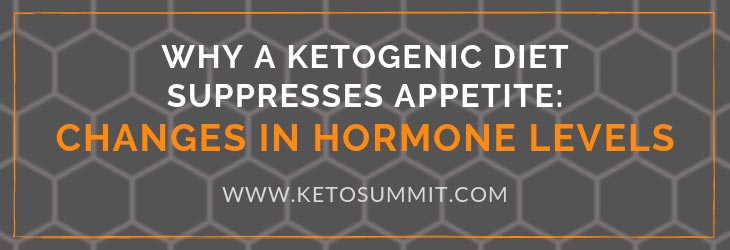
Why A Ketogenic Diet Suppresses Appetite: Changes in Hormone Levels
In the end, whether it’s the high protein amount, high fat amount, or the increase in ketone levels (or a combination of those factors) that causes appetite suppression, it likely comes down to how those factors affect our hormone levels (in addition to how long the foods stay in our stomach).
There are a variety of hormones in our body that affect our appetite. They’re designed to tell us when we’re hungry and when we’re full.
This 2012 article published in Nutrition and Diabetes goes through the hormones that are thought to affect appetite:
- Cholecystokinin (CCK)
- Ghrelin
- Pancreatic polypeptide
- Peptide YY
- Glucagon-like peptide (GLP)-1
- Oxyntomodulin
This 2013 study published in the European Journal of Clinical Nutrition found “several hormones and nutrients which influence appetite were altered after weight loss induced by a ketogenic diet.”

What’s the Answer? Why Does Keto Makes You Less Hungry?
There appears to be a fair amount of both anecdotal as well as scientific evidence to suggest that a ketogenic diet does make you feel less hungry. Exactly, how it does this is still hotly debated. Personally, I think it’s a complicated mix of all the factors researchers have been investigating along with the fact that you really can’t get hardly any hyperpalatable foods on a ketogenic diet. Hyperpalatable foods typically contain both fats and carbohydrates, and that could explain why both low carbohydrate and low fat diets have been found to make you less hungry and feel more full.
However, as this recent paper states,
“How [ketosis] can affect satiety and hunger mechanisms is still a matter of debate.”
So, if you’re looking to try a ketogenic diet to lose weight, then one of the ways it could help you do so is by making you less hungry and therefore eat less than you would before.

